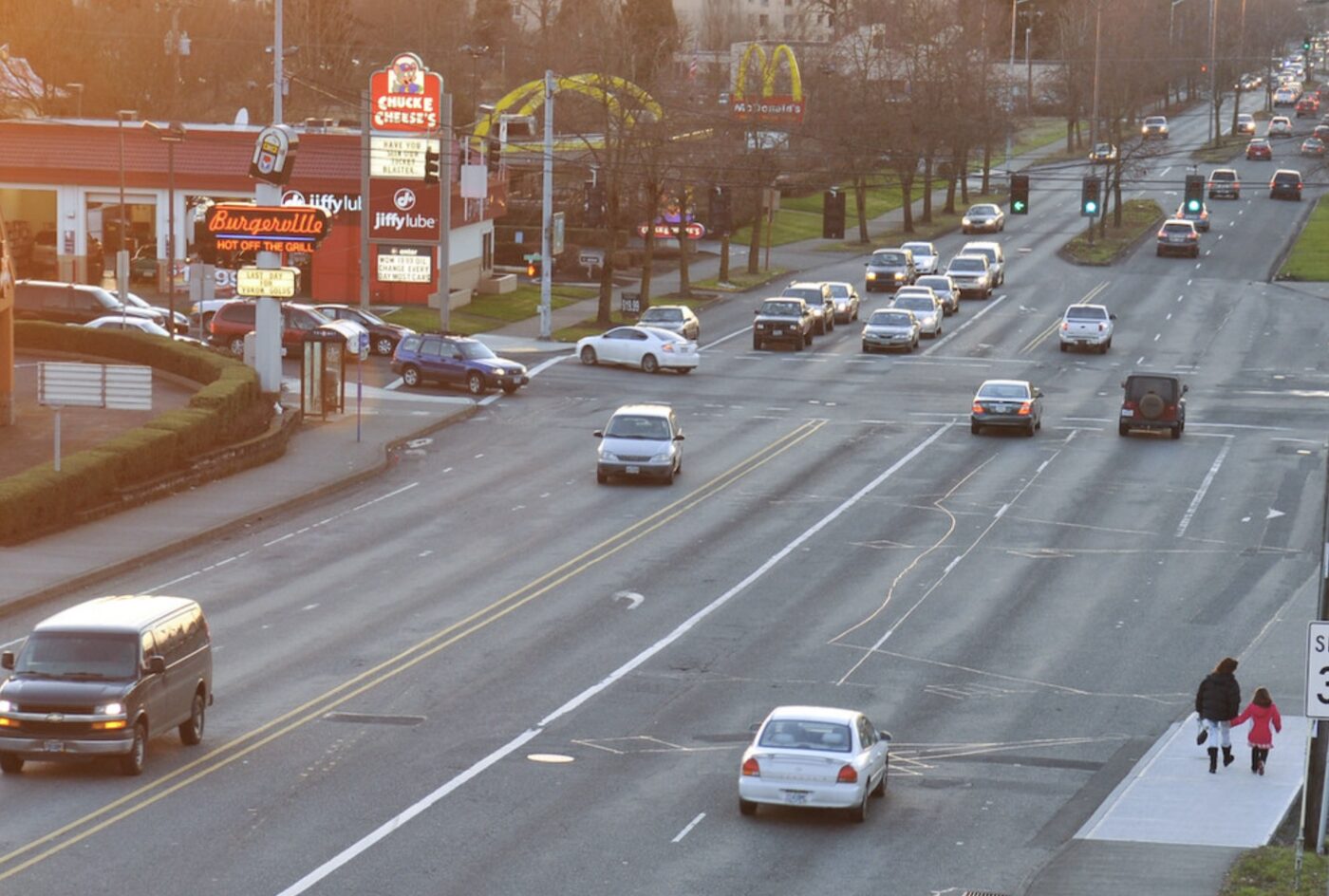$100 million. That’s the estimated amount it would take for the City of Portland to take over control and ownership of Southeast Powell Boulevard from the State of Oregon. Throw in recommended safety upgrades and the price could rise to between $115 to $185 million. Or if we just opted for a few appetizers instead of the full meal, we could get a significant list of safety projects done for $15-30 million.
That was the menu of options delivered to members of the SE Powell Safety Workgroup on April 26th via a presentation shared by the Oregon Department of Transportation and Portland Bureau of Transportation. The presentation laid out the projects it would take to bring the urban arterial highway (a.k.a. Highway 26) up to a “state of good repair.” That’s the condition PBOT requires before they will agree to a jurisdictional transfer.
Portland advocates and officials have long wanted SE Powell Blvd to come under local control for many of the same reasons that process was recently completed for 82nd Avenue: ODOT has proven to be incapable of managing “orphan highways” in a way that centers human life and neighborhood livability. On 82nd Avenue, the transfer happened after two people were killed by drivers trying to cross the road in separate crashes less than two weeks apart. On Powell, an effort to take the road out of ODOT’s hands was sparked last October after Portlander Sarah Pliner was hit and killed by a right-turning truck driver as she attempted to bike across Powell. That incident, which happened right outside Cleveland High School and a popular park, touched off a wide-ranging effort from a group of advocates, school officials, neighborhood residents, and elected leaders that have met monthly since Pliner’s death.
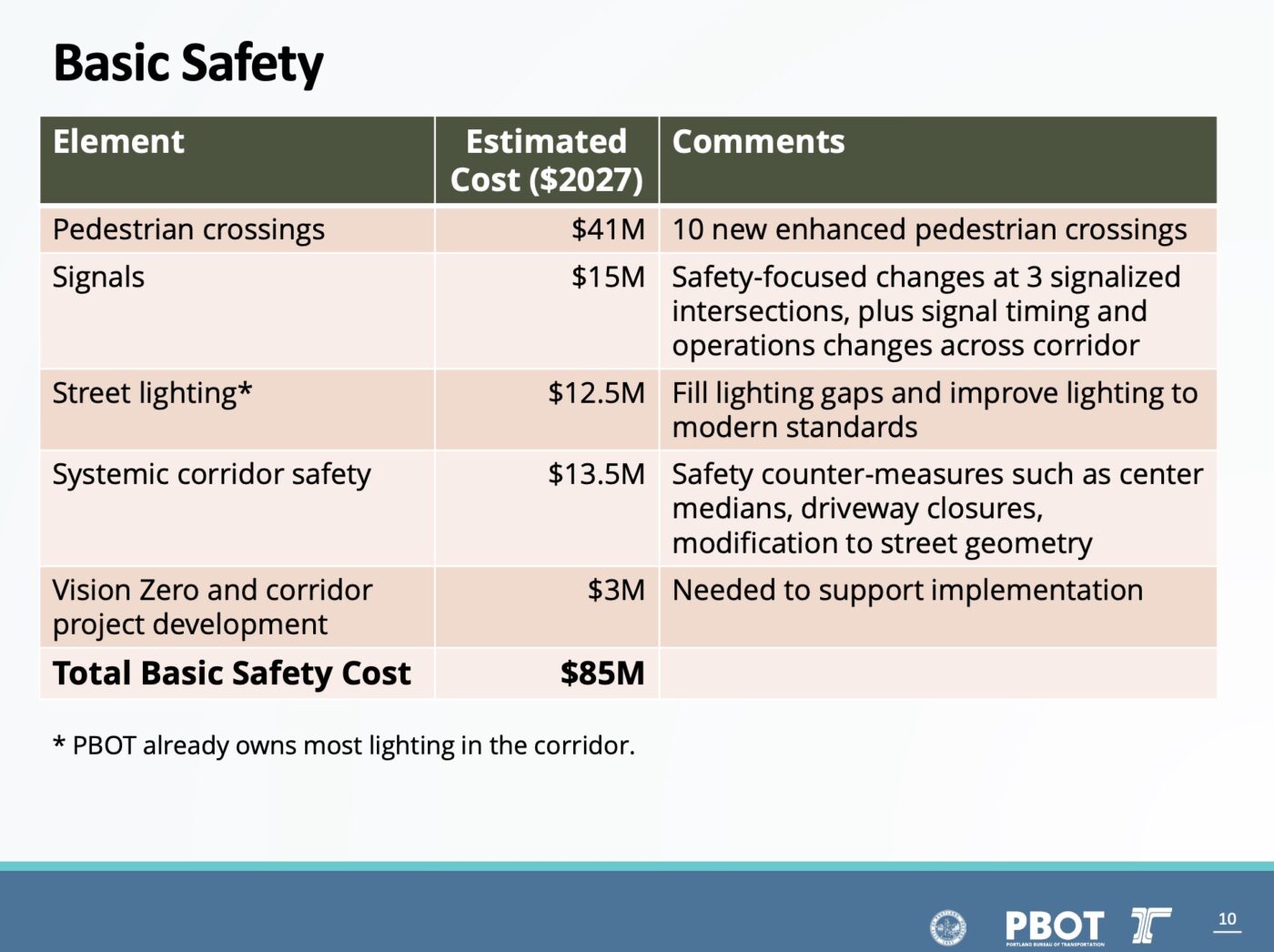
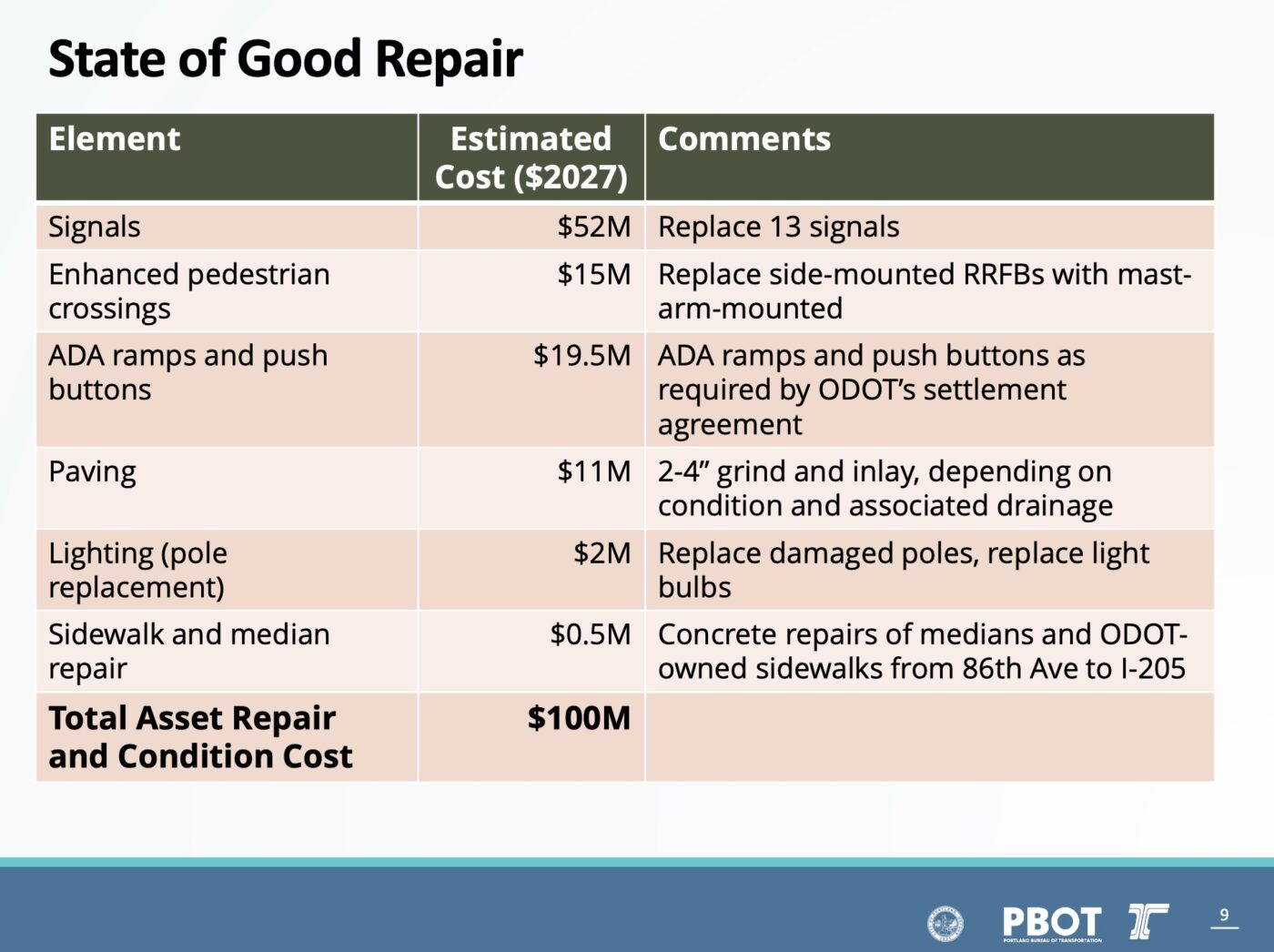
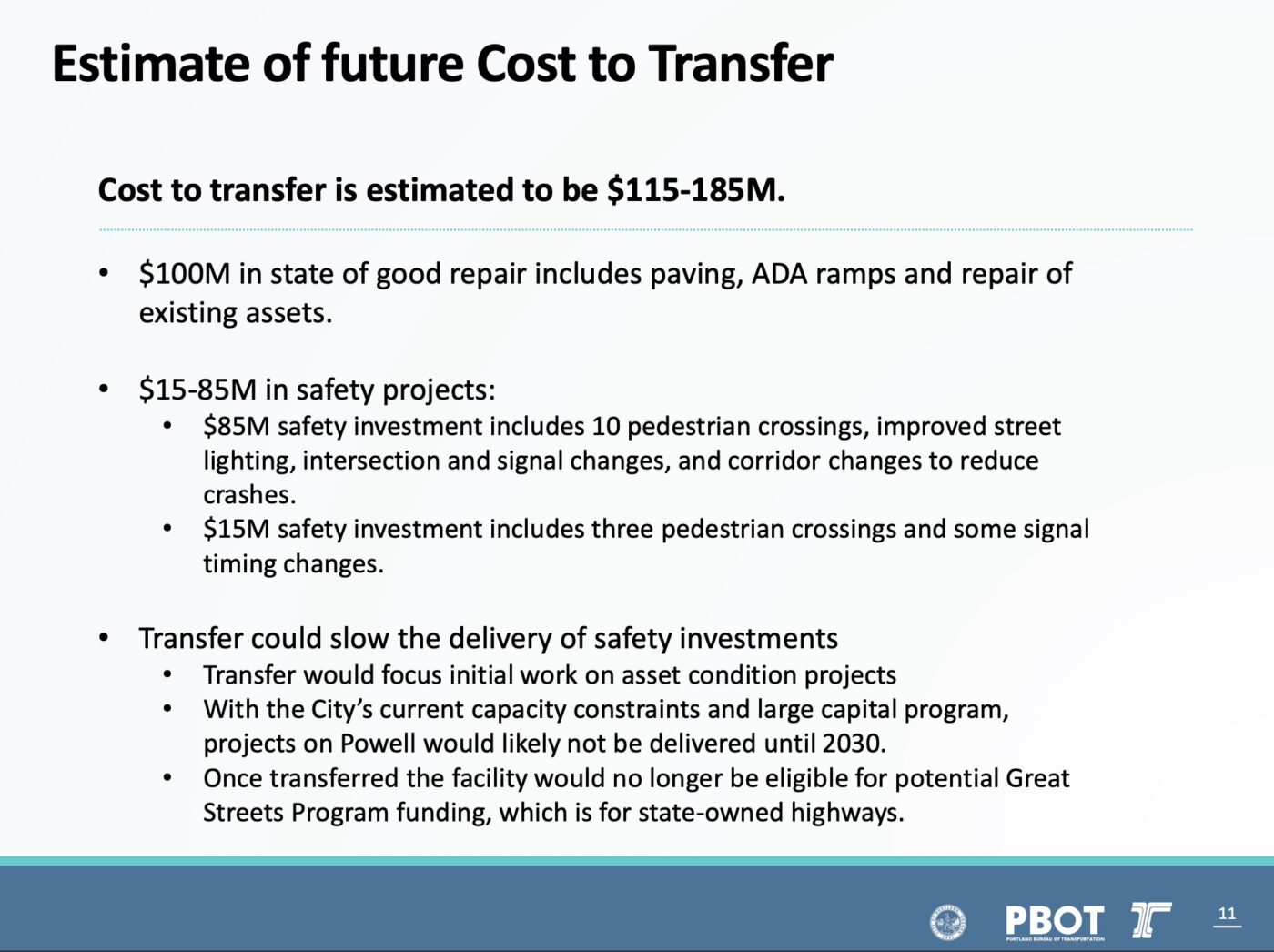
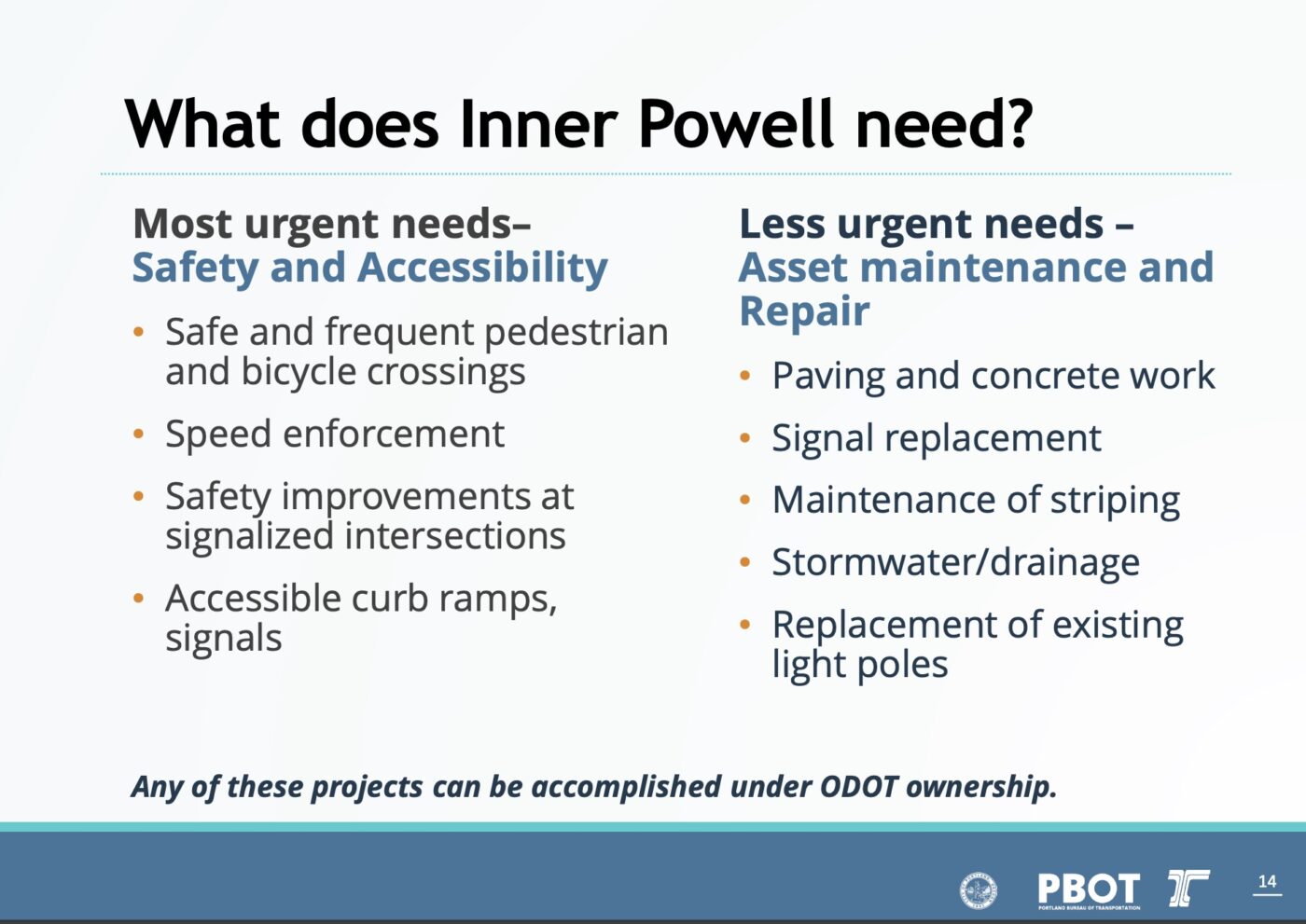
That workgroup has been instrumental in creating the pressure and partnership needed for PBOT and ODOT to make numerous changes to the area around where Pliner was killed. On October 6th, just two days after Pliner died, then PBOT Commissioner Jo Ann Hardesty said, “Enough is enough. The neglect of state-owned ODOT roads within Portland is why we recently brought 82nd Avenue under local control, and we must now begin the process of transferring Southeast Powell Blvd along with funds that cover the true cost of the needed safety improvements all along the boulevard.” Hardesty then brought a resolution to City Council that initiated work with ODOT to, “determine what it would take to improve the street to city and community standards for safety and maintenance for a future jurisdictional transfer.”
Hardesty was not the only one who wanted to switch Powell from state to local control. In 2017, the Oregon Legislature passed a bill (HB 2017) that required ODOT to study the issue. That led to the 2019 State of Good Repair Study that estimated the cost to be around $31 million — less than a third of the current estimate. A report published by Metro in 2020 ranked all potential jurisdictional transfers in the region and Powell was at the top of the list. Like other ODOT highways, Powell has a disproportionate number of serious injury and fatality crashes and there’s a strong consensus that ODOT should stick to managing freeways and leave local roads to local agencies.
Since the push for a safer Powell began back in October, ODOT and PBOT have lowered speed limits, beefed up schools zones, improved crossings, added new signage and pavement markings, and more. But it’s not enough.
Lawmakers who are part of the Safety Workgroup — House representatives Mark Gamba, Khanh Pham, Rob Nosse and Senator Kathleen Taylor — want more. Taylor, who has children at Cleveland High School, has spearhead the effort. After hearing the presentation at the April 26th meeting, she submitted a formal letter (PDF) to the co-chairs of the Joint Committee on Ways and Means saying funding for this Powell transfer was one of her top priorities.
Just two years ago the legislature came up with $80 million for the 82nd Avenue transfer and Taylor and her fellow lawmakers feel their case for Powell is just as strong.
If they don’t get the funding this session, there’s a plan B already in effect. House Bill 2793 (-2 amendment) was filed just two weeks ago by Oregon House Rep. Ben Bowman, a Democrat who represents Tigard and Beaverton. The bill seeks to create a new Jurisdictional Transfer Advisory Committee within ODOT that Nosse says will, “set up a process to stage and vet jurisdictional transfers and set us up to find a source of funding for them.” Bowman is another member of the coalition of legislators who want more local control of ODOT highways and is chief sponsor of HB 2756, a bill that would transfer SW Hall Blvd (OR-141) to the City of Tigard.
(Note: Both HB 2756 and 2793 have a public hearing at the Joint Committee on Transportation tomorrow.)
For their part, ODOT and PBOT say there are some disadvantages to jurisdictional transfer — especially when it comes to Powell Blvd. In their presentation to the Workgroup they said the transfer could slow down the delivery of “most urgent” safety projects because the required and “less urgent” state of good repair projects would focus initially on pavement maintenance and repair projects instead of things like safer bike crossings and speed enforcement. They also issued a warning: “With the City’s current capacity constraints and large capital program, projects on Powell would likely not be delivered until 2030,” the presentation stated. Another point to consider is that once the road is transferred it would no longer be eligible for funding through ODOT’s Great Streets grant program which is only for state-owned highways.
Instead of going straight for the transfer, PBOT and ODOT recommend starting with $15-30 million in safety projects that would include:
- Enhanced pedestrian crossing at SE 36th Ave – $500,000
- Add enhanced pedestrian crossings at existing marked crossings – $3M each (Potential locations include 45th Ave, 54th Ave, between 57th/58th Ave, 61st Ave, 75th Ave, 84th Ave)
- School zone + safe route improvements in Creston area – $3M
- School zone + safe route improvements in Kellogg area – $3M
- Signal timing and ITS improvements – $6M
- School speed zones and safe routes improvements on other state-owned arterials – $3.5M per school for 10 schools located on / adjacent to state highways in Portland
With the budget picture at PBOT abysmal right now and with Senator Taylor and her colleagues’ influence at the legislature, it seems the best bet is that this coalition comes away from the session with funding to get started on these immediate safety projects. Stay tuned.

